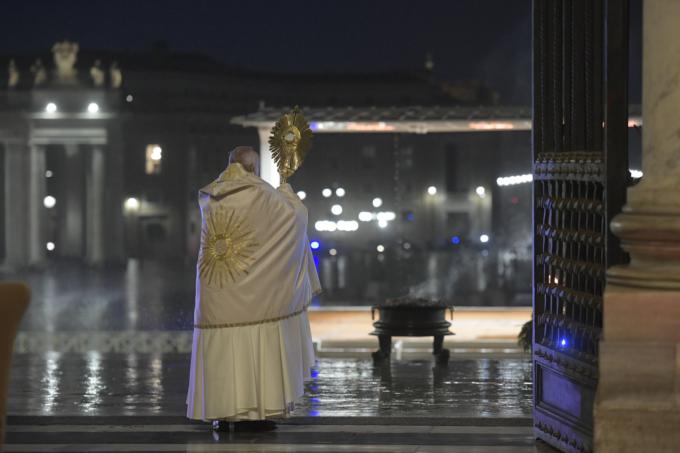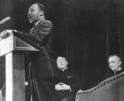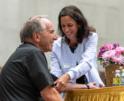
Culture
With a world in chaos, deeply divided ideologically, secularly and spiritually, Pope Francis' finest moment came when he quietly and hauntingly brought all sides together, from all corners of the planet, to make prayers of supplication -- for healing, for consolation, for mercy and for wholeness -- before Christ Jesus.

Scalia
As the world absorbs the news of the death of Pope Francis -- and before the ever-busy oddsmakers and deep insiders begin the game of papabile speculation that accompanies every papal death and conclave -- let us rest for a moment and appreciate what were (arguably) the five most memorable moments of the Franciscan papacy:
5: The Joy of the Gospel. The encyclical "Laudato Si'" (and its successor, "Laudato Deum") has gotten wide attention being concerned, as it is, with matters of environment and Christian stewardship. But Francis' apostolic exhortation "Evangelii Gaudium" actually speaks profoundly to a relevant -- truly crushing -- issue of our times: Our need to focus on realities over illusions or trending notions and to proclaim Jesus Christ as the incarnate founder of all reality.
Society has descended into a seeming chaos of ideas finding action before consequences are considered or debated, so one appreciates all that Pope Francis cautioned against in this document, including the havoc of ideas given room to run wild, all untethered to what is real: "It is dangerous to dwell in the realm of words alone, of images and rhetoric. ... realities are greater than ideas. This calls for rejecting the various means of masking reality: angelic forms of purity, dictatorships of relativism, empty rhetoric, objectives more ideal than real, brands of ahistorical fundamentalism, ethical systems bereft of kindness, intellectual discourse bereft of wisdom."
Published in November 2013, the first year of his pontificate, Francis is describing the world we live in, now. His advice to pull away from the folly of unfettered imagination is a valuable call to reality -- not because the Christian church lacks vision or compassion, but because she is visionary enough to know that human conceits can arise in even the best-intended actions, and that compassion must exist in substance.
And substance is what she serves, in order to feed the spirit: "The principle of reality, of a word already made flesh and constantly striving to take flesh anew, is essential to evangelization. ... Not to put the word into practice, not to make it reality, is to build on sand, to remain in the realm of pure ideas and to end up in a lifeless and unfruitful self-centredness and gnosticism."
4: "Who am I to judge?" This one gets a little dicey because of a human inclination to cherry-pick a quote to better fit it for battle -- something that has become all-too common in our age but is as old as slyness itself. As the devil can quote Scripture to suit his own purposes, ideologues from every side took those five words from a 2013 in-flight press conference, denuded them of context and then swung them about like a Klingon bat'leth.
When Francis spoke off-the-cuff, he frequently surprised (and had sometimes been unclear enough to need later clarification) but perhaps never more so than with these words, which -- when read in context -- are no carte blanche to unfettered sexual license as some proclaimed and others feared, but a qualified endorsement for Christians to bear with one another, and a recognition of a simple Christian reality: "If someone is gay and he searches for the Lord, and has goodwill," said the pontiff, "who am I to judge?"
All the huffing hyperventilation that followed only demonstrated how little we have grown since the days of the early church, when the first pope told Christians, "You must esteem the person of every man" (1 Pt 2:17).
3: Early in his papacy, Francis had a habit -- doubtlessly one that left his security team a bit frazzled -- of wading out into the crowds, or making a point of engaging someone who broke through to him.
In July 2013, as the popemobile drove slowly through the adoring throngs in Rio de Janeiro who had gathered for World Youth Day, 9-year-old Nathan de Brito managed to get past the barricades and reach the vehicle. He moved Francis to tears as he called out, "Your Holiness, I want to be a priest of Christ," and found himself lifted up into the embrace of the pope, who promised to pray for him. But he had a request of the boy: "I ask you to pray for me," he said, adding, "as of today, your vocation is set."
Mere months later, in November in St. Peter's Square, the Holy Father, again putting little space between himself and the people, spotted a severely disfigured man standing apart and made his way to him. The man -- his face and head covered with horrific-looking boils due to neurofibromatosis -- found himself embraced by the pope, chosen above all others to receive his kiss and reverent blessing as they both prayed. In both cases, the world watched and wept, not in sadness but in quiet wonder.
By the way, Nathan de Brito, that little boy from Rio de Janeiro, entered a seminary in 2023.
2: In his 2016 apostolic letter "Misericordia et Misera," Pope Francis established the first World Day of the Poor, later kicking it off in the Paul VI Hall by sharing a beautifully catered luncheon with the destitute of Rome. The meal became a tradition that -- after pausing for two years due to the global pandemic -- was joyfully reestablished in 2022.
Even earlier, however, the pontiff had arranged for showers to be provided for the homeless near the Bernini colonnades embracing St. Peter's Square.
The pope's proclamation was a gentle and demonstrative call to a generosity that, while not really arduous, is nevertheless radical: "The works of mercy affect a person's entire life. For this reason, we can set in motion a real cultural revolution, beginning with simple gestures capable of reaching, body and spirit, people's very lives. This is a commitment that the Christian community should take up, in the knowledge that God's word constantly calls us to leave behind the temptation to hide behind indifference and individualism in order to lead a comfortable life free of problems. Jesus tells his disciples: 'The poor you always have with you' (Jn 12:8). There is no alibi to justify not engaging with the poor when Jesus has identified himself with each of them."
1: With a world in chaos, deeply divided ideologically, secularly and spiritually, Pope Francis' finest moment came when he quietly and hauntingly brought all sides together, from all corners of the planet, to make prayers of supplication -- for healing, for consolation, for mercy and for wholeness -- before Christ Jesus.
On March 27, 2020, alone in St. Peter's Square, Francis carried before him a heavy monstrance, its brilliance not intended to dazzle, but meant only to emphasize the simple white Host by which Jesus presents his physicality to the world. His hands wrapped in a humeral veil -- the better to emphasize that the origin of the blessing came not from human hands or hearts but from Christ, eternal -- Francis blessed the entire frightened and locked-down world, placing it into the keeping of the Triune God and Creator.
Those who watch social media will, if asked, recall the astonishingly poignant and perfectly needed action by the pontiff and the almost unthinkable unanimity of praise that could be found, from left to right, from every religious persuasion, even from unbelievers who perhaps deemed it better to say little in the face of such gravity and transparent intention.
"He did the truly necessary thing," I tweeted that out into the teeming ether that night. And for once, no one disagreed.
Rest in peace, Franciscus.
- Elizabeth Scalia is culture editor for OSV News.
Recent articles in the Culture & Events section
-
The best of Francis: Five unforgettable momentsElizabeth Scalia
-
Scripture Reflection for April 27, 2025, Sunday of Divine MercyDeacon Greg Kandra
-
Dr. King's visit to Boston and St. John's Seminary 60 years agoViolet Hurst
-
The honor of caring for our priestsKate Marshall
-
Scripture Reflection for April 13, 2025, Palm Sunday of the Lord's PassionDeacon Greg Kandra























